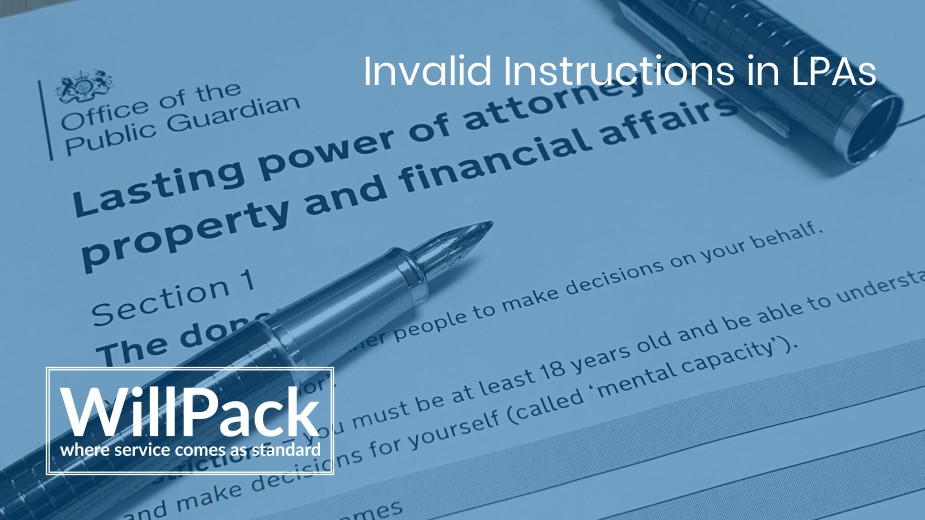Instructions are legally binding statements included in Lasting Powers of Attorney (LPAs) that the attorneys must comply with.
Instructions should be carefully worded to ensure they are straightforward, easy to understand and capable of being put into practice. If instructions are unclear, not possible or too complicated, the Office of the Public Guardian (OPG) may refer the LPA to the Court of Protection (COP) for interpretation. The COP may then need to remove the instruction from the LPA, known as severing.
There are a number of provisions that cannot be included in an Instruction in LPAs.
Amending the donor’s will
Attorneys do not have the authority to amend the donor’s will or make a new will for the donor. It is not possible to give them this authority. If the donor has lost capacity, an application would need to be made to the COP to make a Statutory Will for the donor.
Gift giving
Subject to instructions saying otherwise attorneys of property and financial affairs LPAs have a statutory power to make reasonable gifts to charities that the donor may have given to, and family members, friends or acquaintances of the donor on customary occasions. More information on this power can be found in a previous article.
Instructions cannot allow attorneys to act beyond these powers. For example, an instruction providing the following will be invalid:
- Make gifts into a trust fund for grandchildren or others.
- Make gifts to charities, organisations or persons who the donor had no connection with.
- Pay school fees for grandchildren or others.
- Make interest-free loans.
- Make gifts to avoid contributing to the donor’s care fees – this would be seen as deliberate deprivation.
- Make gifts to reduce the size of the donor’s estate for inheritance tax purposes.
If attorneys wish to make gifts beyond their powers, they would need to make an application to the COP.
Business affairs
It cannot be stated that some attorneys deal with the donor’s business affairs and others with the donor’s private affairs. If the donor wishes to have separate attorneys deal with their personal and business affairs, they must make separate LPAs with clear instructions on what affairs each LPA is for.
Criminal offences
Attorneys cannot be made to do something against the law. The most common wish relating to this is anything related to euthanasia or assisted suicide.
Considering other people
Attorneys can only act in the best interests of the donor. The LPA therefore cannot state that they act in the best interests of the donor’s spouse, partner, children or any other person.
Attorneys do have the power to maintain the donor’s spouse, civil partner or dependent children, but instructions to provide for them beyond maintenance or to maintain other people will be invalid.
Replacement attorneys
Replacement attorneys will start acting if a trigger event occurs. These events are:
- the attorney disclaims
- the attorney dies
- the attorney is made bankrupt or subject to a debt relief order (for property and financial affairs LPAs only)
- the attorney loses mental capacity
- if the attorney is the donor’s spouse or civil partner and the marriage or civil partnership between them ends (subject to an instruction saying otherwise)
There is however some flexibility when it comes to replacing attorneys acting jointly and severally. See our previous article for more details on this.
It cannot be stated that replacement attorneys can step in and act in special circumstances, such as if original attorneys are on holiday or ill. It is also not possible to give an attorney the power to appoint a replacement.
A replacement attorney cannot replace another replacement attorney. Any provision directing this will be invalid.
Miscellaneous
Health and welfare restrictions should not be included in a property and financial affairs LPA and vice versa.
Instructions relating to life sustaining treatment in a health and welfare LPA will be invalid if the attorneys are not granted the authority to make these decisions.
In a health and welfare LPA, an instruction providing the attorney to act before the donor has lost capacity will be invalid as attorneys on a health and welfare LPA can only act when the donor has lost capacity.
It cannot be stated as an instruction that one attorney has to do what another attorney says or that they can act by majority. The only options for how joint attorneys can act are jointly, jointly and severally and jointly for some decisions and jointly and severally for others. This could however be included as a non-binding preference.


 © Trust Wills & Probate Limited t/a WillPack. All rights reserved.
© Trust Wills & Probate Limited t/a WillPack. All rights reserved.
You must be logged in to post a comment.